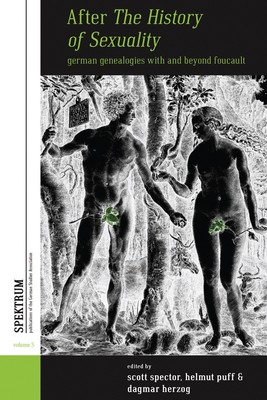
- We will send in 10–14 business days.
- Publisher: Berghahn Books
- ISBN-10: 0857459376
- ISBN-13: 9780857459374
- Format: 15.2 x 22.9 x 1.7 cm, softcover
- Language: English
- SAVE -10% with code: EXTRA
After the History of Sexuality (e-book) (used book) | bookbook.eu
Reviews
Description
Michel Foucault's seminal The History of Sexuality (1976-1984) has since its publication provided a context for the emergence of critical historical studies of sexuality. This collection reassesses the state of the historiography on sexuality--a field in which the German case has been traditionally central. In many diverse ways, the Foucauldian intervention has governed the formation of questions in the field as well as the assumptions about how some of these questions should be answered. It can be argued, however, that some of these revolutionary insights have ossified into dogmas or truisms within the field. Yet, as these contributions meticulously reveal, those very truisms, when revisited with a fresh eye, can lead to new, unexpected insights into the history of sexuality, necessitating a return to and reinterpretation of Foucault's richly complex work. This volume will be necessary reading for students of historical sexuality as well as for those readers in German history and German studies generally who have an interest in the history of sexuality.
EXTRA 10 % discount with code: EXTRA
The promotion ends in 16d.20:59:03
The discount code is valid when purchasing from 10 €. Discounts do not stack.
- Publisher: Berghahn Books
- ISBN-10: 0857459376
- ISBN-13: 9780857459374
- Format: 15.2 x 22.9 x 1.7 cm, softcover
- Language: English English
Michel Foucault's seminal The History of Sexuality (1976-1984) has since its publication provided a context for the emergence of critical historical studies of sexuality. This collection reassesses the state of the historiography on sexuality--a field in which the German case has been traditionally central. In many diverse ways, the Foucauldian intervention has governed the formation of questions in the field as well as the assumptions about how some of these questions should be answered. It can be argued, however, that some of these revolutionary insights have ossified into dogmas or truisms within the field. Yet, as these contributions meticulously reveal, those very truisms, when revisited with a fresh eye, can lead to new, unexpected insights into the history of sexuality, necessitating a return to and reinterpretation of Foucault's richly complex work. This volume will be necessary reading for students of historical sexuality as well as for those readers in German history and German studies generally who have an interest in the history of sexuality.


Reviews